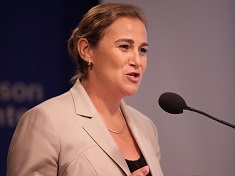-
Sally Edwards on Health and Climate Change in the Caribbean: “It’s a Very Complex Web”
August 14, 2015 By Carley Chavara “The relationship between human health…and environmental changes is extremely complex,” says Sally Edwards, advisor for sustainable development and environmental health of the Pan-American Health Organization/World Health Organization office for the eastern Caribbean countries, in this week’s podcast.
“The relationship between human health…and environmental changes is extremely complex,” says Sally Edwards, advisor for sustainable development and environmental health of the Pan-American Health Organization/World Health Organization office for the eastern Caribbean countries, in this week’s podcast.“The relationship between human health…and environmental changes is extremely complex,” says Sally Edwards, advisor for sustainable development and environmental health of the Pan-American Health Organization/World Health Organization office for the eastern Caribbean countries, in this week’s podcast.
“What we do know is that there are enormous numbers of interconnections and it needs to be looked at from quite a broad perspective because there is not any sort of only unique, directional relationship of just two things, it’s a very complex web of interrelationships,” she says.
“The bad news about adaptation is we can’t really see the future really clearly”Flooding from extreme weather events in the Caribbean not only directly puts people in harm’s way but also increase waterborne diseases, says Edwards. Nutrition can be affected if crops or food stored low to the ground are contaminated, polluted water can drain into public waterways, and sea-level rise can inundate coastal wells.
These effects are exacerbating existing problems. “In the Caribbean, the infrastructure is aging and failing,” says Edwards, “there’s a lot of breakages in the system so even if you are having treated water being put into the system at the beginning, that is not what is coming out in peoples’ houses.”
“Yes, they have access to piped water,” she says. “But is the water coming out of those pipes of a quality that we regard safe for human consumption? The answer is no.”
Avoiding Unintended Consequences
Some environmental programs with good intentions have had negative unintended consequences as well. To combat water scarcity, the government of Barbados passed a law requiring certain buildings to have rainwater storage capacity. However, the mandate didn’t specify the need for pumps or proper water usage, causing an “enormous proliferation” of mosquitoes, resulting in a rise of dengue fever, says Edwards.
“The bad news about adaptation is we can’t really see the future really clearly,” says Edwards. This is especially difficult in the Caribbean given the lack of available data. “You need a certain amount of data to get statistically significant models, especially going into the future,” she says.
But while “not all climate risks are avoidable,” much more can be done, says Edwards. On the household level, increased awareness of proper water and food storage can improve food security while decreasing instances of waterborne disease. With agriculture, using retreated wastewater can sustain production while reducing climate vulnerability.
And there are examples of successful adaptation programs by governments. In Barbados, coastal zone protection programs have committed marine and coastal areas to conservation while creating public parks and recreational areas.
The key is keeping in mind the potential for unintended consequences during planning, Edwards says. “It’s very important we think about some of the other consequences that they can have and make sure we are looking at all of the pluses and minuses that they can gave and what can we do in regard to the minuses, because sometimes they are very easy things to correct.”
Sally Edwards spoke at the Wilson Center on July 28.
Friday Podcasts are also available for download on iTunes.
Topics: adaptation, agriculture, Caribbean, climate change, community-based, conservation, consumption, development, environment, environmental health, featured, flooding, food security, Friday Podcasts, global health, Latin America, natural resources, nutrition, oceans, podcast, protected areas, sanitation, water
 A Publication of the Stimson Center.
A Publication of the Stimson Center.

 “The relationship between human health…and environmental changes is extremely complex,” says Sally Edwards, advisor for sustainable development and environmental health of the
“The relationship between human health…and environmental changes is extremely complex,” says Sally Edwards, advisor for sustainable development and environmental health of the 

